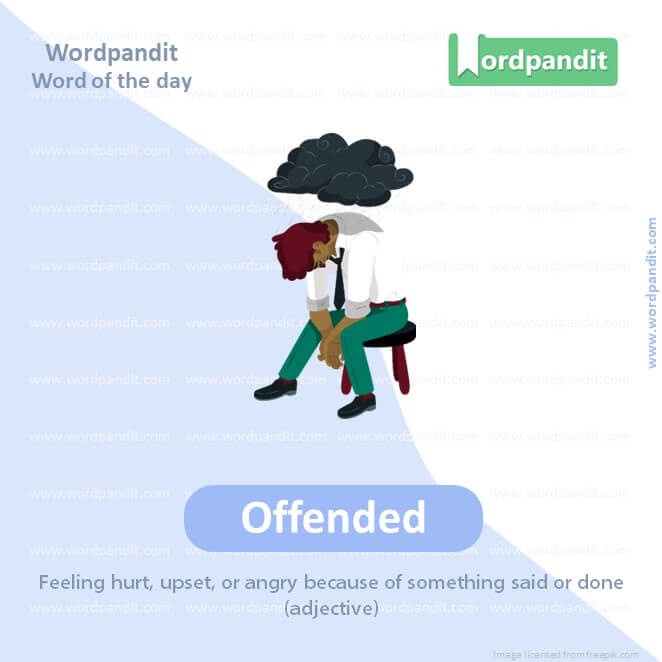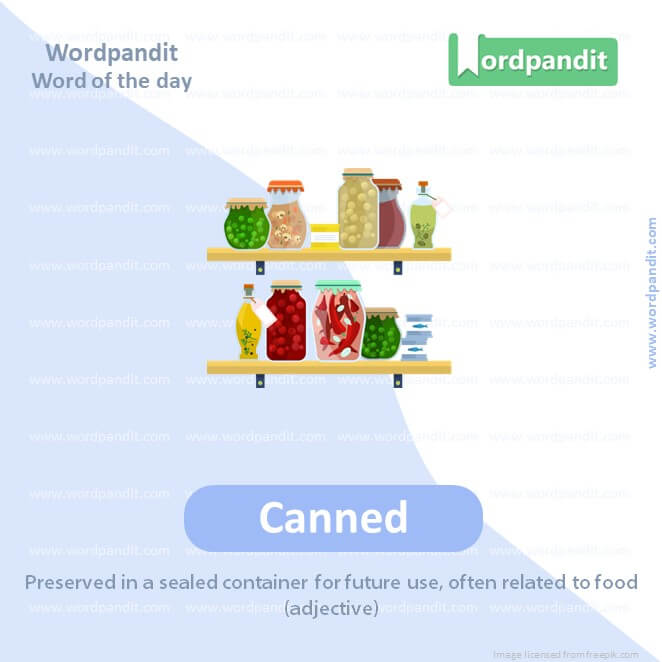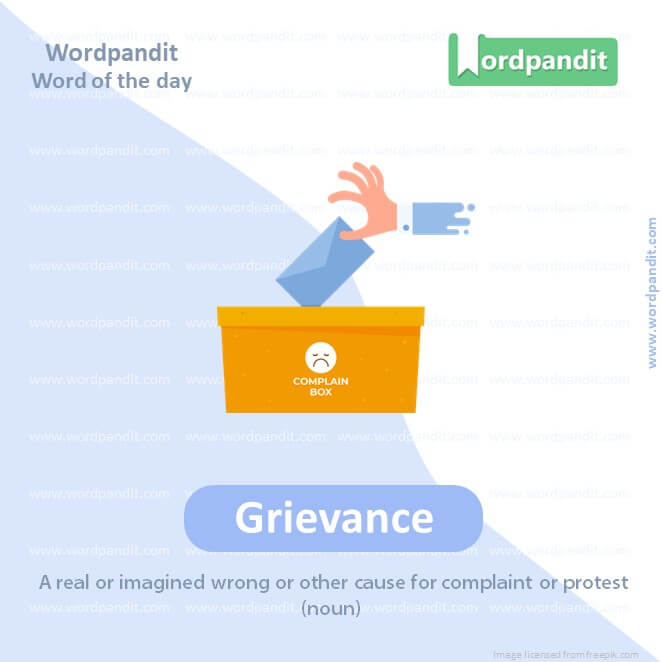Daily Vocabulary Words: List of Daily Used Words in Leading Indian Newspapers
Hi there. Welcome to this special section @ Wordpandit. Our endeavour here is straightforward: highlighting daily vocabulary words that you would come across in leading newspapers in the country. We have included the following newspapers in our selection:
• The Times of India
• The Economic Times
• Hindustan Times
• Mint
• Indian Express
We are putting in extensive work to develop your vocabulary. All you have to do is be regular with this section and check out this post daily. This is your repository of commonly used words; essentially, we are posting a list of daily used words. Hence, this has significant practical application as it teaches you words that are commonly used in leading publications mentioned above.
Visit the website daily to learn words from leading Indian newspapers.
WORD-1: Obsession
CONTEXT: In its obsession with treating Indians as children, India keeps coming up with strange things. The latest is inside a policy draft released by the ministry of information and broadcasting to seek public opinion.
SOURCE: Livemint
EXPLANATORY PARAGRAPH: Imagine you really, really love a toy and you think about it all the time, even when you’re eating or playing. That’s what ‘obsession’ is like. It’s when your mind is filled with thoughts about one thing a lot.
MEANING: A state where someone thinks about something constantly or frequently with great focus and intensity (noun).
PRONUNCIATION: uhb-SESH-uhn
SYNONYMS: fixation, preoccupation, mania, infatuation, craze
USAGE EXAMPLES:
1. His obsession with dinosaurs made him read all the books about them.
2. She developed an obsession for painting during summer.
3. His obsession with cleanliness made his room spotless.
4. The movie character’s obsession with treasure led him on many adventures.

WORD-2: Offended
CONTEXT: In 2021, it proposed a provision by which a film that has already been certified by the censor board can be reviewed if a person in the audience is offended.
SOURCE: Livemint
EXPLANATORY PARAGRAPH: When someone says or does something that makes you feel bad or sad, like saying you can’t play with them, that’s feeling ‘offended.’ It’s like having hurt feelings.
MEANING: Feeling hurt, upset, or angry because of something said or done (adjective).
PRONUNCIATION: uh-FEN-did
SYNONYMS: insulted, hurt, upset, aggrieved, affronted
USAGE EXAMPLES:
1. She was offended by his rude comment.
2. He felt offended when he wasn’t invited to the party.
3. Her joke offended some of her friends.
4. He apologized for offending her during their argument.

WORD-3: Charlatans
CONTEXT: In a nation where it is a norm for people to wait years for justice, this policy attempted to provide express relief to those claiming to be offended, a group that can include charlatans and extortionists. The dim idea was canned. I don’t know why; its dimness is an unlikely reason.
SOURCE: Livemint
EXPLANATORY PARAGRAPH: A ‘charlatan’ is like someone who pretends they can do magic tricks but actually can’t. They trick people into believing they are something they are not.
MEANING: People who pretend to have skills or knowledge they don’t actually possess, often to trick others (noun).
PRONUNCIATION: SHAR-luh-tans
SYNONYMS: frauds, impostors, fakes, quacks, deceivers
USAGE EXAMPLES:
1. The charlatans claimed they could cure any illness.
2. Beware of charlatans who offer quick and easy solutions.
3. He was exposed as a charlatan when his lies were discovered.
4. The charlatan tricked people into buying worthless products.

WORD-4: Extortionists
CONTEXT: In a nation where it is a norm for people to wait years for justice, this policy attempted to provide express relief to those claiming to be offended, a group that can include charlatans and extortionists. The dim idea was canned. I don’t know why; its dimness is an unlikely reason.
SOURCE: Livemint
EXPLANATORY PARAGRAPH: Think of someone who is like a bully, who asks for your lunch money and says they’ll be mean to you if you don’t give it. That’s like an ‘extortionist.’ They try to get something from someone by threatening them.
MEANING: People who obtain something, especially money, from others by force or threats (noun).
PRONUNCIATION: ik-STOR-shuh-nists
SYNONYMS: blackmailers, racketeers, shakedown artists, swindlers, coercers
USAGE EXAMPLES:
1. The extortionists demanded money in exchange for safety.
2. He reported the extortionists to the police.
3. The shop owner was harassed by local extortionists.
4. Extortionists threatened to reveal his secrets unless he paid.
WORD-5: Dim
CONTEXT: In a nation where it is a norm for people to wait years for justice, this policy attempted to provide express relief to those claiming to be offended, a group that can include charlatans and extortionists. The dim idea was canned. I don’t know why; its dimness is an unlikely reason.
SOURCE: Livemint
EXPLANATORY PARAGRAPH: ‘Dim’ is when there’s not much light, like at bedtime when you have just a little lamp on. It’s not really bright, but it’s not totally dark either.
MEANING: Not bright or clear, often used to describe light or vision (adjective).
PRONUNCIATION: dim
SYNONYMS: faint, subdued, murky, dull, shadowy
USAGE EXAMPLES:
1. The room was dim and cozy.
2. He could barely see in the dim light.
3. Her memory of the event was dim.
4. The stars were dim in the city sky.

WORD-6: Canned
CONTEXT: In a nation where it is a norm for people to wait years for justice, this policy attempted to provide express relief to those claiming to be offended, a group that can include charlatans and extortionists. The dim idea was canned. I don’t know why; its dimness is an unlikely reason.
SOURCE: Livemint
EXPLANATORY PARAGRAPH: ‘Canned’ is like when you take fruits or vegetables and put them in a metal container so you can eat them later. They’re not fresh, but they’re saved in a can.
MEANING: Preserved in a sealed container for future use, often related to food (adjective).
PRONUNCIATION: kand
SYNONYMS: preserved, tinned, packaged, stored, jarred
USAGE EXAMPLES:
1. She opened a can of canned peaches.
2. Canned foods are convenient for camping.
3. They donated canned goods to the food drive.
4. He prefers fresh vegetables over canned ones.
WORD-7: Thin-skinned
CONTEXT: The guidelines prescribed age-ratings and attempted to create a system where thin-skinned Indians offended by content must first approach the grievance committee of the platform instead of taking the more entertaining route of police stations and courts.
SOURCE: Livemint
EXPLANATORY PARAGRAPH: If you’re ‘thin-skinned,’ it’s like having skin that feels everything, even a soft touch. It means you get your feelings hurt or get upset easily, even if someone is just joking.
MEANING: Easily upset or offended by the things other people say or do (adjective).
PRONUNCIATION: thin-SKIND
SYNONYMS: sensitive, touchy, easily hurt, delicate, fragile
USAGE EXAMPLES:
1. She’s too thin-skinned to handle criticism.
2. His thin-skinned nature made it hard to joke around him.
3. Being thin-skinned, he felt upset by the light teasing.
4. Her thin-skinned response surprised everyone.

WORD-8: Grievance
CONTEXT: The guidelines prescribed age-ratings and attempted to create a system where thin-skinned Indians offended by content must first approach the grievance committee of the platform instead of taking the more entertaining route of police stations and courts.
SOURCE: Livemint
EXPLANATORY PARAGRAPH: A ‘grievance’ is when you feel something is unfair or wrong, like if someone takes your toy without asking. It’s a complaint about something you think isn’t right.
MEANING: A real or imagined wrong or other cause for complaint or protest (noun).
PRONUNCIATION: GREE-vuhns
SYNONYMS: complaint, objection, protest, grumble, beef
USAGE EXAMPLES:
1. The workers voiced their grievances about pay.
2. He filed a grievance against his boss.
3. Her main grievance was the lack of communication.
4. The meeting was an opportunity to discuss their grievances.
WORD-9: Suffocated
CONTEXT: A person who was in the same room when a major streaming platform and the government spoke told me that platforms feel suffocated by this government’s loud and frequent contemplation of how it wishes to control what is viewed.
SOURCE: Livemint
EXPLANATORY PARAGRAPH: ‘Suffocated’ is like feeling you can’t breathe, as if all the air is gone from around you. It’s when something is stopping you from breathing properly.
MEANING: Having difficulty breathing or feeling as if you are not getting enough air (verb).
PRONUNCIATION: SUHF-uh-kay-tid
SYNONYMS: choked, smothered, stifled, strangled, asphyxiated
USAGE EXAMPLES:
1. He felt suffocated in the crowded room.
2. The plant suffocated under the plastic cover.
3. She felt suffocated by the strict rules at home.
4. Without fresh air, he suffocated quickly.
WORD-10: Regression
CONTEXT: The regression of India into a culturally sensitive society has already affected the viewing experience of Indians. HBO Max, famed for its quality content, had planned to enter India and produce local stories, but the platform eventually dropped the plan.
SOURCE: Livemint
EXPLANATORY PARAGRAPH: Think of when you learned to ride a bike without training wheels, but then one day you needed them again. That’s like ‘regression.’ It’s when you go back to doing something the way you used to, like a step backward.
MEANING: A return to a less developed state or to a previous pattern of behavior (noun).
PRONUNCIATION: re-GRESH-uhn
SYNONYMS: retreat, return, backsliding, relapse, retrogression
USAGE EXAMPLES:
1. The child’s regression to baby talk worried his parents.
2. After the injury, he experienced a regression in his skills.
3. The team’s regression was evident in their recent losses.
4. She noticed a regression in her progress after taking a break.
Vocabulary Words in English
In the kaleidoscopic world of language, the thread of ‘vocabulary words in English’ weaves a rich tapestry. These words, the building blocks of communication, lend themselves to the eloquence and effectiveness of our speech and writing. Despite their significance, mastering ‘vocabulary words in English’ can sometimes be daunting, but with strategic approach, the process can be greatly simplified.
Learning ‘vocabulary words in English’ goes far beyond rote memorization. It requires an integrated approach that encompasses understanding and using the words. Consuming a diverse range of English materials such as novels, news articles, movies, music, and online content can acquaint you with words in actual use, helping you perceive both their meaning and usage in different contexts.
Furthermore, incorporating memory-enhancing techniques can add impactful strides to your journey of mastering ‘vocabulary words in English’. Methods such as the Leitner System or flashcards can bolster the memory retention of these words. Meanwhile, using mnemonic devices, associating words with unique stories or images, can help in retaining the ‘vocabulary words in English’ in long-term memory.
Another key to deciphering ‘vocabulary words in English’ is by practicing them in real-world contexts. Incorporate the new words into your daily conversations, written emails, or social media posts. Not only will this reinforce the meanings and applications, but also boost your confidence in using them.
In essence, understanding ‘vocabulary words in English’ is a continual journey that calls for persistent commitment, diverse learning approach, and ample practice. As you indulge in this exploration, you will find your command over the ‘vocabulary words in English’ becoming stronger, leading to more confident and dynamic communication. Remember – in the world of language, words are your faithful companions, and the more you engage with them, the more they’ll reveal their richness to you.













